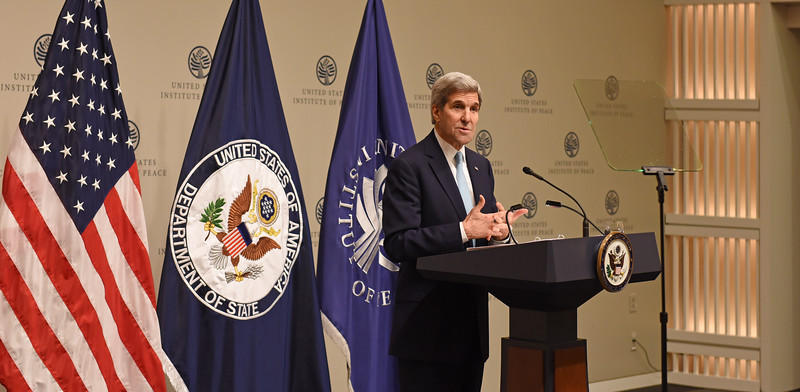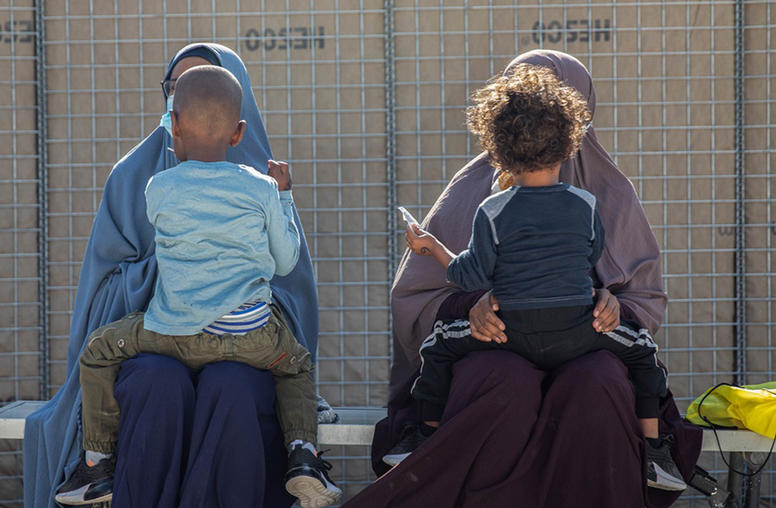Kerry Says Assad Staying as Syrian Leader Is a "Non-Starter"
USIP Speech Outlines U.S. Approach on Syrian War Ahead of Resumed Talks
Secretary of State John Kerry, in an address at the U.S. Institute of Peace on the U.S. approach to the war in Syria, reinforced the administration’s firm opposition to allowing President Bashar al-Assad to remain in power under any resolution to the 4 ½-year conflict. Before leaving the U.S. today to resume talks on Syria in Vienna, Kerry pledged accelerated U.S. diplomatic and military efforts to end the fighting and defeat the self-styled “Islamic State” extremist group.

The Vienna talks this weekend follow a declaration of agreed principles issued after an initial round of discussions on Oct. 30 that involved representatives of the United Nations, the European Union, the U.S. and 16 other countries. Kerry said they aim to develop a timetable for interim steps, involve “a broad range” of Syrian men and women and achieve “a political transition that will empower the center against the extremes.”
“This isn’t just a fight we must make on behalf of others, as important as that might be.” – Secretary of State John Kerry
He acknowledged the difficulty of reaching a breakthrough considering the myriad sides and interests engaged in the conflict, particularly Russia and Iran’s backing for Assad. Citing years “of indiscriminate violence and torture and bloodshed,” the Secretary said, “asking the opposition to trust Assad or to accept Assad’s leadership is simply not a reasonable request; it is literally, therefore, a non-starter.”
“Neither peace nor the defeat of Daesh is possible with Assad in power,” Kerry said, using the Arabic acronym for the extremist group that has terrorized Syria and neighboring Iraq and either directed or been linked to deadly attacks in Afghanistan, Yemen, Libya, Egypt, Turkey and France.
The group, he emphasized, poses serious threats to U.S. national security.
“This isn’t just a fight we must make on behalf of others, as important as that is at times,” he said. “We know for a fact that Daesh means what it says when it threatens to attack America and attack Americans and attack America’s interests.”
In addition to the participants in the Oct. 30 meeting in Vienna, Kerry mentioned the Arab League among the participants this week.
“America’s message to each is that we all have a responsibility not to dig in our heels but to take the next step forward, so that the bleeding can stop and the building can begin,” Kerry told the overflow crowd at USIP. The speech also touched on the Obama administration’s work on climate change, the Iran nuclear agreement, Ebola in Africa, landmark trade agreements and support of Ukraine, as President Barack Obama prepares to attend next week’s G-20 Leaders Summit in Turkey.
Military, Diplomatic, Humanitarian Efforts
On Syria, he said the administration will build on its strategy “in the weeks and months to come,” and outlined military, humanitarian and diplomatic efforts.
A 65-member U.S.-led military coalition is fighting the Islamic State group in Iraq and Syria, an effort he said is likely to go on for years. Still, the militants already are unable to operate in 20 percent to 25 percent of the territory that they controlled a year ago, and the U.S. is deploying fewer than 50 special operations forces while increasing shipments of supplies and ammunition to moderate rebels, he said. In neighboring Iraq, he noted, the Iraqi army and militias, backed by the U.S. coalition, recaptured the northern city of Tikrit earlier this year, allowing some 100,000 people to return to their communities. The U.S. aim in Iraq is a “fully sovereign, stable and self-reliant Iraq that is secure in its borders and able to protect all of its citizens,” Kerry said.
The U.S. also has contributed more than $4.5 billion in humanitarian aid and recently announced an increase in the number of Syrian refugees who would be admitted to the U.S. And he cited the 2013 agreement with the Assad regime for the international Organization for the Prohibition of Chemical Weapons to remove and destroy Syria’s stockpile of such arms.
Neither Assad nor Syria’s disparate opposition groups have participated directly thus far in the Vienna talks, Kerry said. But the U.S. has been in regular contact with the opposition from the beginning helping them “in ways both public and private,” and encouraging them to unify. The participants in the Oct. 30 meeting agreed, among other points, that the U.N. should convene the Syrian opposition and the government to develop a plan that would lead to “credible, inclusive, non-sectarian governance, followed by a new constitution and free, fair, transparent, accountable elections” held to the highest global standards, he said.
“Whatever questions one might have about the content of our policy, there should be no doubt about the effort made to consider every option for ending this crisis,” Kerry said, implicitly rejecting criticism that the administration hasn’t done enough.
Still, Kerry has a daunting task in seeking a resolution to a conflict that has defied multiple rounds of peace talks and divided one Syrian opposition coalition after another. The brutality of the war intensified with Assad’s use of barrel bombs dropped from aircraft onto civilian areas, and the Islamic State group’s entry into the fighting with beheadings, rapes and kidnappings. And in September, the fighting accelerated again as Russia began air strikes in Syria. Officials in Moscow said they were targeting the Islamic State group, but military experts have said most of their assaults have struck anti-Assad rebels.
'Not Only Regional But Global Security'
USIP President Nancy Lindborg, in introducing Kerry, told the audience that the war in Syria “threatens not only regional but global security.” She cited the gripping scenes of refugees flooding into Europe, many of them from Syria, and statistics that show, of the 60 million people worldwide who have been forced from their homes by violent conflict, 12 million are Syrian.
“The Syrian conflict has become one of the most pressing tragedies of our time,” Lindborg said. “With the conflict growing more complex and more bloody by the day, the global community must urgently work together to provide desperately needed civilian protection and achieve a meaningful and lasting peace.”
Kerry also noted that “the longer this terrible civil war lasts, the harder it will be for the country to recover.” He laid responsibility for the war, which has killed an estimated 250,000 people and forced half the country’s population out of their homes, squarely at the feet of Assad.
“The violence only began when Assad responded to peaceful demonstrations by sending in thugs to beat up young people. And when the parents of those young people objected and took to the streets themselves, the regime replied first with bullets, then with bombs,” Kerry said. “Having made peaceful change impossible, Assad made war inevitable.”
The war also gave rise to the Islamic State group, he said. And he equated the militants with Assad, saying, “although Assad and Daesh are supposed to be bitter opponents, they are both parts of the same problem.”
“In fact, the rise of Daesh is directly attributable to the policies and actions of the Assad regime,” Kerry said. “They even do business with each other, buying and selling oil. Assad and Daesh are enemies far more in theory than in fact.”
The challenge for the U.S. and its partners in the Vienna talks, Kerry said, is to “create conditions under which a clear and broadly acceptable alternative can emerge.”



